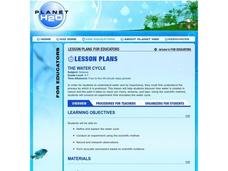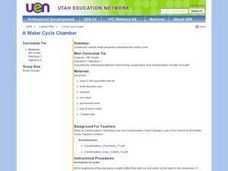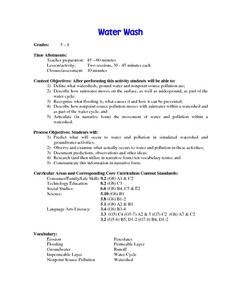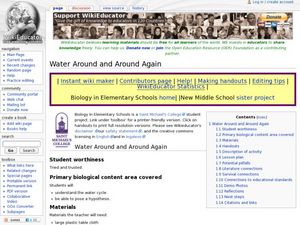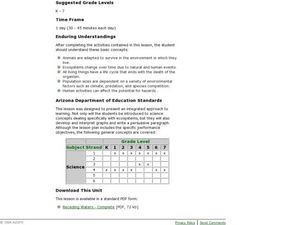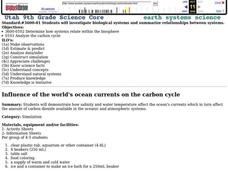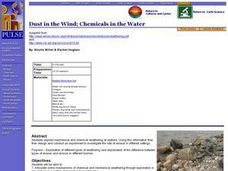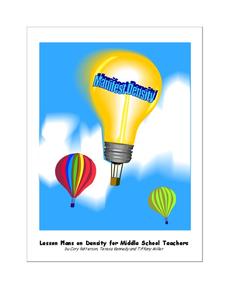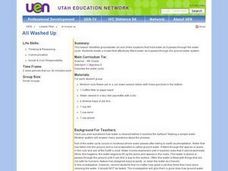Curated OER
The Water Cycle
Students research the water cycle and identify main vocabulary associated with the water cycle. They build and observe a closed system model that demonstrates the water cycle in action.
Curated OER
A Water Cycle Chamber
Fourth graders are shown the water cycle by watching a demonstration by their teacher. In groups, they are given one two-liter bottle with a starter hole and follow instructions to complete the set up. They place ice cubes into the...
Columbus City Schools
ABC: Acid Base Chemistry
Bubble, bubble, boil and trouble! What causes common substances like baking soda and vinegar to react the way they do? Welcome your junior chemists to the wonders of acid-base chemistry using a comprehensive and fun resource. Engage them...
Curated OER
Water Filtration
As an example of nature's water filtering system, young ecologists conduct an experiment in the lab. They construct a funnel out of a plastic bottle, fill it with specified layers of materials that simulate layers of soil, then run muddy...
Curated OER
The Water Cycle
Students observe and identify the stages of the water cycle by observing a simulated water cycle. They complete worksheets demonstrating their knowledge.
University of Miami
What is it? Weathering, Erosion, or Deposition?
Just as rocks move through the rock cycle, your giddy geologists will move descriptions around until they are all in the correct category. After cutting out several types of rock movement, learners determine whether the action is...
Curated OER
Water Wash
Students define watersheds, ground water and nonpoint source pollution. They describe how rainwater moves on the surface, as well as underground, as part of the water cycle. They recognize what flooding is as well as its causes.
Curated OER
Moving without Wheels
Learners observe a simple water cycle model to better understand its role in pollutant transport. This activity shows one way in which pollution is affected by the water cycle; it simulates a point source of pollution in a lake and the...
Curated OER
Rock Cycles, Crayon Cycles
Students examine the rock cycle and the path that rocks go through to rearranged in different ways. They define key vocabulary terms, then in small groups conduct a variety of experiments using crayon shavings as simulated rocks and...
Curated OER
Water Around and Around Again
Young scholars form a hypothesis for a water cycle experiment. In this water cycle lesson plan, students create their own environment with water and earth to study the water cycle. Young scholars complete a handout to make a hypothesis...
Forest Foundation
Forest Watersheds
Where does the water we use come from? To understand the concept of a watershed, class members study the water cycle and then engage in an activity that simulates a watershed.
NOAA
A Laboratory Simulation of Ocean Surface Currents
Stimulate interest in ocean currents with a simulation. The first installment of a five-part middle school series teaches future oceanographers about the forces that interact to cause ocean currents. A simulation shows how wind and the...
Curated OER
The Rain Maker
Second graders work in small groups with a cup each of several materials. Students layer the gravel, sand, and water into a resealable bag. They draw a picture of this bag in their water journal. Students place their sealed bags in a...
Curated OER
Receding Waters
Students explore the effect of environmental factors on ecosystems. In this wildlife and ecology lesson, students identify and describe the stages in a frog's life cycle. Students participate in a simulation demonstrating the impact of...
Curated OER
Water and Ice
Young scholars explore water as it changes states of matter. In this physical property lesson, students use observation, measurement, and communication skills to describe changes in water as it goes from a solid to a liquid and back again.
Curated OER
Earth Systems
Ninth graders investigate biological systems. They summarize relationships between systems. Students determine how systems relate within the biosphere. They analyze the carbon cycle.
Curated OER
Dust in the Wind; Chemicals in the Water
Students explore mechanical and chemical weathering at stations. They articulate some mechanisms of chemical and mechanical weathering through exploration in a lab. Students stations describe how chemical weathering differs from...
University of Southern Indiana
Manifest Density
There's a lot content packed into the four lessons of this physical science unit on density. From salad dressing to the water cycle and hot air balloons, these lessons engage students in hands-on activities that explore real-world...
Curated OER
Fred the Fish -- A River Ran Wild
Students apply cause and effect relationships to water pollution in a stream. In this pollution lesson students recognize the importance of clean water in their daily lives. Students accompany "Fred the Fish" as he travels down stream....
Curated OER
Identifying Watersheds with Topographic Maps
Students model a watershed and delineate one using topographic maps. For this hydrology lesson, students use aluminum foil to model a landscape and observe how water moves on it. They also observe the features of a topographic map and...
CK-12 Foundation
Electric Analogies
We can see the result of electricity but not the process itself. The simulation compares electric circuits to a water tower and water wheel cycle. Young scientists adjust the height of the tower, the amount of resistance, and if the...
Curated OER
Monarch Migration
Third graders investigate the life cycle of the Monarch butterfly. They experiment with various tools to simulate the mouth parts of insects, conduct research, record their observations of butterflies hatching, write a play, complete...
Curated OER
All Washed Up
Fourth graders simulate filtration of water containing contaminates to determine how nature cleans water. They make predictions, report observations, and construct reasonable explanations concerning their outcomes. then connect this to...
NOAA
The Incredible Carbon Journey: Play the Carbon Journey Game
Class members explore the carbon cycle in the final installment of the 10-part Discover Your Changing World series. They play a simulation game where they walk through the steps carbon takes as it cycles through the different layers of...


